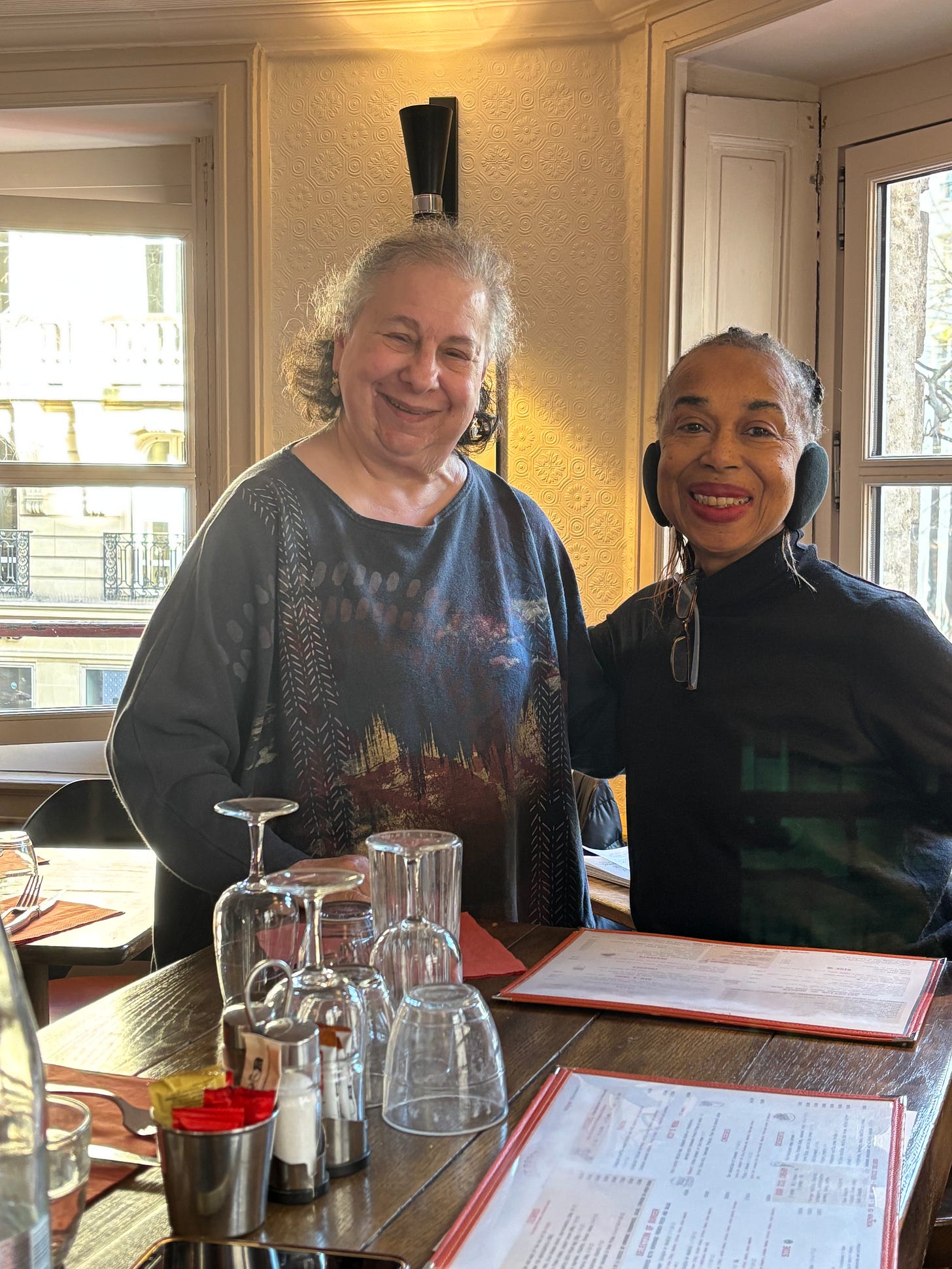One of the top 50 jazz vocalists of all time.
- Jazz Magazine
Jeri Brown was one of eight writers at Paris Cafe Writing in early December. I feel fortunate to have had the opportunity to interview her about a crucial turning point in her life. You can find her recordings on Apple Music and Spotify.
Note: This interview took place at the Cafe de la Mairie on the Rue de Bretagne in the Marais.
I am Jeri Brown: artistic voice, citizen of the world of imagination, black woman, griotte, performer, poet, writer and academic.
While she may not leap buildings at a single bound, Jeri Brown’s multifaceted life as jazz artist, professor, writer, and mom, comes close. If there is such a thing as an Everywoman, Jeri fits the profile while breaking the mold.
Josephine Baker was from St. Louis, and so am I.
In the early 1990s, Jeri was a busy professor at three universities in Ohio—Cleveland State, University of Akron, and Kent State. In addition, she was an in-demand jazz performer, recording artist, and the mother of two children. But everything changed when she was offered a full-time faculty position at Concordia University in Montreal.
This unanticipated change in direction dramatically altered her life. The move brought a host of challenges as she plotted the move. The Blackpool boundary marks the corridor between Montreal and New York City. The border crossing took on a symbolic significance as she moved back and forth between her new home and her family in Cleveland.
The move brought a host of challenges, not least helping her children adjust not only to a new country with no family close by, coping with a new language, and negotiating a very different cultural environment. The university helped her settle into a comfortable brownstone, with a landlady who spoke no English. And yet, they managed to communicate and become friends.
Unlike the rest of Canada, Quebec’s population is more than 80% French Canadian and francophonie predominates. Her son and daughter were immediately plunged into total immersion classes, as was Jeri herself.
Her daughter, who now teaches advanced-placement French in the U.S., had the dream teacher, encouraging her love for the language through reading. Her son, however, had nightmare language instructors, who sowed antipathy rather than acceptance, creating frustration and resistance. In the end, while remaining in Canada, he studied advanced business techniques, moving to Toronto and a much more anglophone community where he has minimal exposure to French.
With temporary visa after temporary visa, Jeri had to decide whether the move to Canada was permanent. Once she made that decision, the fun of dealing with bureaucracy for permanent visa through citizenship was a maze of complicated steps. After over thirty years as a Canadian resident, she is certain the effort was worth making.
On top of these challenges, Jeri still had contractual performances all over the world, and while this made her a great ambassador for her new country, the stresses of travel and arranging childcare on top of her professorial commitments were grueling. Flying out for a gig, performing for one night, flying home, and teaching the next day took its toll
In a conversation with Abbey Lincoln, they commiserated on the difficulties of being everything to everyone along with grueling realities of travel. Although she had the chance to work with outstanding performers like jazz great Wynton Marsalis, she eventually fired her agents, took fewer performing opportunities, and devoted more time to teaching and family.
A performer from the age of three, Jeri stretches the traditional boundaries of jazz, hovering on the edge in her improvisations. Improvisional jazz usually is more daring by instrumentalists than by singers. Jeri’s interpretations of the doubie doubie do, have brought her both accolades and criticism.
As a proponent of freeing the voice, she has also thrown off the shackles from constraints and expectations. She knows what she wants to accomplish, and a bit on the wild side, she charts her own path.
The watchwords of Jeri’s life and career are adaptation, navigation, and optimism. In Montreal she has been fortunate to find a welcoming, accepting community that allowed her to pursue future opportunities and pathways.
As a teacher, Jeri specializes in working with singers with disabilities, helping them using roadblocks as launching pads and the disabilities as assets, a process she calls creating vocal ecosystems. Students are encouraged to start where they are and then build techniques to move them forward in developing new skills, using physical movement as one component.
Over her career, Jeri has turned student skepticism and resistance toward her techniques into acceptance and achievement—with the result being many amazing success stories. But her own story of acceptance, perseverance, and daring may be the greatest success story of them all.
Symbolized by moving through the gateway of Blackpool and creating a new life on the other side, she is a model of inspiration for anyone facing unexpected challenges and uncertainty in their own life.






Jeri Brown is the author of Skin Folk, a myriad of written stems and shapes about kin (adult, family, e-book: Jongleur Publishing) and They Won’t Believe You: Dolena’s Journey(adult, true crime e-book: Jongleur Publishing), and has 16 award-winning albums to her credit. Find out more about Jeri at www.jeribrown.com.









What a fascinating story with so many parallels to my own. I grew up in Cleveland. When I was working in Chicago, my wife got offered a teaching position at McGill University, which is right next to Concordia. We too had to go through the Kafkaesque process of becoming landed iommigrants and then Canadian citizens. We lived there for 15 years and raised our own kids in Montreal. All of us had to struggle through learning French. Eventually I did business in French. Now we are all in San Diego but grew so much from our time in Montreal.
Very interesting interview of a brilliant and resilient woman!